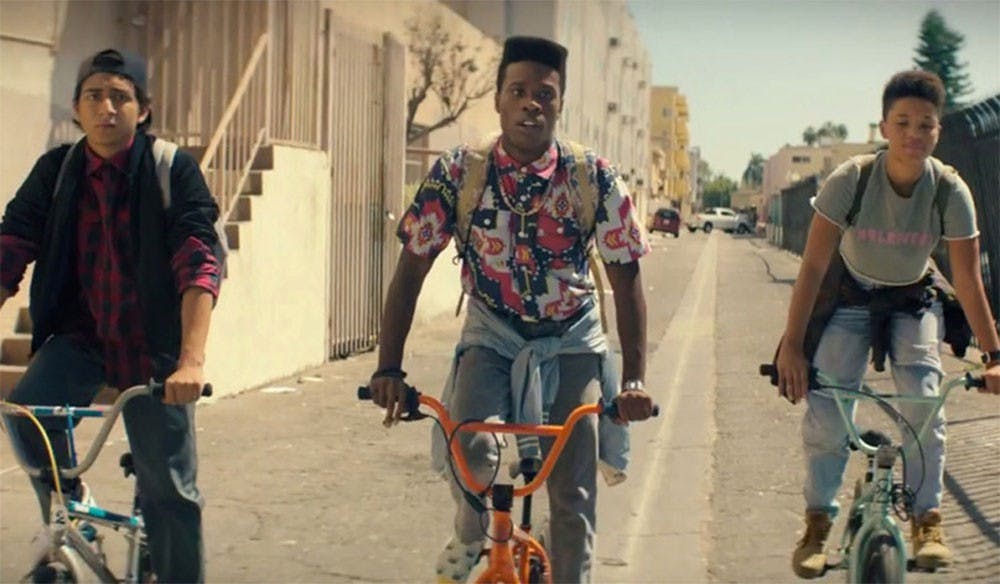“Dope” is the coming of age film black millennials have been waiting for.
Shameik Moore stars as Malcolm, a black kid growing up in Inglewood, California, raised by his single mother (Kimberly Elise). Malcolm has a penchant for 90’s hip-hop, vintage clothing and VHS tapes of old episodes of “Yo! MTV Raps!” The movie centers on Malcolm and his best friends’ attempts to navigate liminal spaces as safely and narrowly as possible, while he also vies for admission to Harvard.
The kids grow up floating between two worlds. They’re black but not nearly “black enough” for their hood. And they’re geeks, but still not geeky enough to make their blackness palatable to white folks. So the trio fights to maintain their unit — their individuality — in the face of environments which reject those identities. This, to me, is a deeply personal plotline — an experience I’ve waited most of my life to see validated on screen. “Dope”, then, carried quite the burden.
The turn of the film — and one of it’s initial failures — is when the characters find themselves caught up in a major drug ring, forced to move quite a bit of ecstasy to not only stay alive but stay in the good graces of Malcolm’s college connect, a Harvard graduate also out of Inglewood who currently runs a successful business and moonlights as a Southern California dope kingpin. Hijinks and hilarity ensue.
My first and most obvious critique about this film is its use of violence and drug sales as an integral plotline. While I understand this gives credence to a certain set of experiences, it still feels wildly reductive to me, as though we can’t have a black film (though I hesitate to describe any movies as such) without them.
I found myself pleased, however, that they chose to use this as a window into the fetishization and appropriation of black culture by white America.
As they move the drugs, the three friends look to an old buddy of theirs from band camp who specializes in hacking and bitcoins — two necessary ingredients in their plan. He is a white stoner obsessed with why he can’t say the “n-word.”
This question rears its head multiple times throughout the film, thus lending itself to a number of conversations which could have been potentially enlightening about the history and the weight behind it. There was a grand opportunity here for Fukiyama to address hip-hop’s reclamation of the “n-word” and its presence in popular culture today. Instead, we were left with a whiny, upper-middle class white boy, snorting “e” and crying reverse racism with no actual dialogue on context.
One of the commendable notes on this film is “Dope” unveils a class of Hollywood’s next great players. It’s an all-star cast: Zoë Kravitz and supermodel Chanel Iman feature alongside two of the movie’s standouts, best friend characters Jib and Diggy. Tony Revolori, who plays Jib, made a noteworthy big screen debut in the Oscar-nominated “The Grand Budapest Hotel” and is already carving out a respectable career for himself. This year alone, Revolori was in two films that premiered at Sundance. Kiersey Clemmons rounds out the list with her role as Diggy, pushing herself well past her Disney Channel filmography.
What’s worth noting, however, is the integration of contemporary hip-hop personalities in the film. A$AP Rocky delivers a solid performance as surprisingly self-aware dope dealer Dom. Up-and-comers Casey Veggies and Vince Staples play minor roles, while even Tyga — most notable of late for Kardashian fame — makes a brief (and forgettable) cameo.
“Dope” has an almost operatic rhythm to it. Along with the likes of “Garden State” and “The Breakfast Club,” “Dope” leaves a lasting impression of a film indelibly linked to its soundtrack. From beginning to end, the movie blasts you with a visual nostalgia seamlessly paired with an audial 90’s-era hip-hop undercurrent. The film relies on these cues working together, and boy does it work. One of the film’s producer’s, Pharrell Williams, has his signature all over this aspect of the project, even writing the songs the characters’ band, Awreeoh, play in the film.
I don’t think I speak for just myself or my group of friends when I say this moment in pop culture, television and film specifically is closer to representing our black experience than ever before.
From a host of brilliant women of color leading prime time television shows to a general age of greater cultural understanding, Hollywood is improving. It’s still way more flawed than it is impressive, but there are strides being made. And after years of shutting us out, I feel as though we’re ushering in a new era of authentication in the media we consume.
“Dope” isn’t perfect. In fact, I was hoping to walk away raving — which I absolutely did not. However, the role these more holistic characterizations of blackness will play moving forward is undeniable.
“Dope,” in all of the ways that count, breaks down many of the stereotypes even I fall prey to internalizing.
This is a movie about a black boy from “The Bottoms” whose greatest aspiration is to get accepted to Harvard. Who plays in a punk band. Who has a queer best friend (whose sexuality isn’t tokenized). Who has no game — no illusions of game — and just hasn’t found his place yet.
“Dope” seamlessly blurs the lines of familiarity and nostalgia in a way which warrants two thumbs up. And like last year’s “Dear White People,” it gives me hope that faces and stories like mine will become normalized on the silver screen in the years to come.
Leah Johnson




